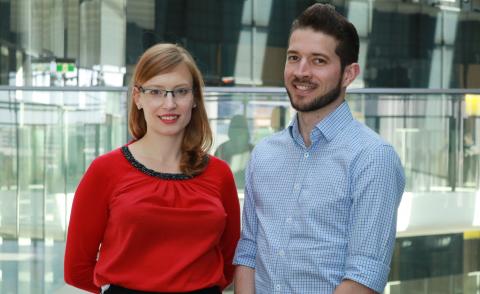
Two mid-career professionals – Lyndon Gallacher and Anna Tanska – recently built connections with international colleagues, supported by Melbourne Genomics.
Collaboration with the Broad Institute
Genetic counsellor Lyndon Gallacher has watched the Alliance’s collaboration with the Broad Institute “go from strength to strength”.
Partnership with the Broad (an institute of Harvard and MIT) has provided additional sequencing methods for a subset of patients unable to be definitively diagnosed through the Melbourne Genomics Childhood Syndromes project and other sequencing projects.
Despite Melbourne’s excellent diagnosis rate for children with suspected genetic disorders – more than half our patients typically receive an answer – help from the Broad Institute’s Daniel MacArthur Laboratory saw a further 40 per cent of 93 undiagnosed families receive a diagnosis.
“What began with the Childhood Syndromes project (2014-15) has snowballed, with the first cohort of approximately 40 diagnosed families now reaching 200 as of this month,” said Lyndon, who travelled to the Broad recently for a two-week immersion visit as an Alliance Ambassador.
“Beyond Melbourne Genomics, it’s likely we will receive approval for another 50 or so families next year. This collaboration is going from strength to strength, and continues to deliver answers for families.”
During his Alliance Ambassadorship, Lyndon met with genetic counsellors, project managers and analysts, and attended laboratory meetings and seminars.
“What became clear was that we are doing really rigorous work here in Melbourne – up with the best of them,” he said. “We have set up a pipeline for our undiagnosed patients that has one of the highest success rates of all of the Broad collaborations.”
Lyndon said the visit also opened his eyes to the expanding roles available for genetic counsellors. In the MacArthur Laboratory, genetic counsellors are employed in roles including project manager, research genetic counsellor and laboratory genetic counsellor. All genetic counsellors in the team are upskilled in genome interpretation (variant curation) and involved in lab-wide analysis meetings.
Lyndon has completed variant curation training through Melbourne Genomics, and will be passing on the skills and knowledge learned at Broad to fellow Alliance professionals at educational workshops next year.
Cancer variant curation ‘Hackathon and Jamboree’
Variant curation was also the key focus of an opportunity for medical scientist Anna Tanska to attend the Cancer Variant Interpretation Hackathon and Curation Jamboree in San Diego. This international event focused on establishing community standards and best practice for bioinformatic analysis and variant interpretation of genome testing for cancer diagnosis and treatment.
“I interpret the genetic changes in advanced cancer cases on a daily basis and I am particularly interested in best practices in cancer curation,” said Anna, who is Medical Scientist – Clinical Genomics, at Peter MacCallum Cancer Centre.
Anna noted that the greatest interest among variant curators was in developing evidence standards for cancer variant clinical actionability – a discussion to which she contributed current cancer curation practices in Melbourne.
“Feedback from the Cancer Variant Interpretation Hackathon and Curation Jamboree will directly benefit and inform cancer curation practices for the member organisations of Melbourne Genomics,” she noted.
“The knowledge gained and new practices highlighted in these international discussions have now been shared with my Melbourne Genomics colleagues, and will be implemented in the future curation workshops and other training materials.”
